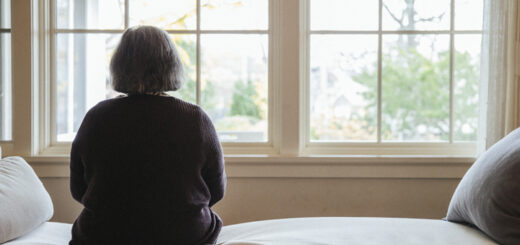More men are stepping up to provide care
While the majority of caregivers are women, there are many men caring for loved ones living with Alzheimer’s or other dementias. Leon Walters and Jay L. of Solano County are two of the millions of male caregivers in the U.S.
Young for her age
The first thing Leon Walters tells you about his wife, Helen, is that she always looked much younger than her age, even as the 86-year-old woman died from Alzheimer’s disease last December.
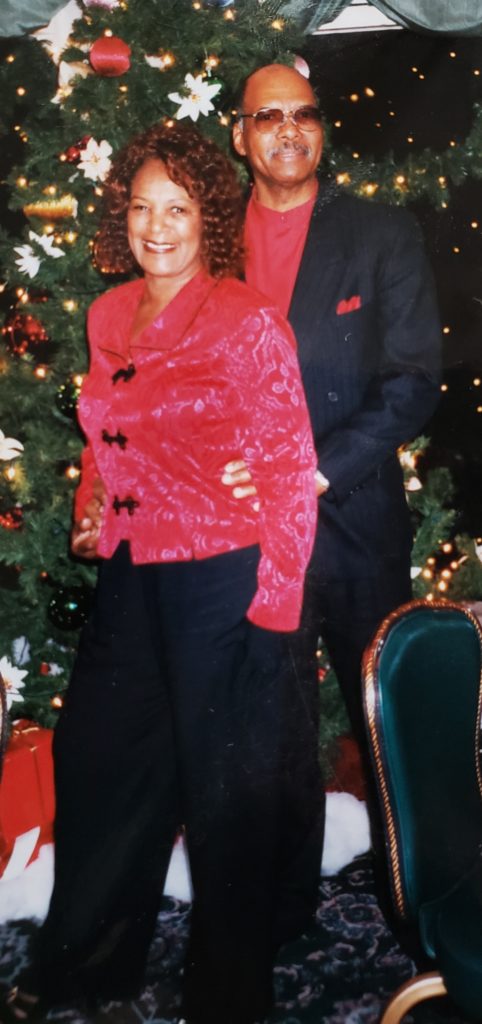
“Everyone would say, “˜I wish I could look like her when I’m half her age.’ Everybody would comment on her skin,” Leon, 76, recalled in a recent interview.
When Helen’s Alzheimer’s symptoms got to the point where she could no longer care for herself, Leon vowed to care for his wife in their Suisun City home with all the love, patience and attention to detail he could muster.
Helen always showered with liquid soap, Leon said, “so I used that all the time, until the end.” Helen enjoyed a splash of her favorite perfume. “So,” he said, “she got that until the end. She got the music (she liked), the food, everything. I kept up with everything.”
Challenges and benefits of the role
Leon is one of the many husbands, sons, brothers and partners who have cared for a loved one with Alzheimer’s or a related disorder. And the ranks of male caregivers are only expected to grow in the coming years as more and more individuals are diagnosed with Alzheimer’s.
Many male caregivers agree that the stress and workload can be exhausting and overwhelming, especially if they ignore their own needs as they care for their loved ones. There are new challenges, but unexpected benefits, as well, that can make the experience rewarding.

“This disease really is awful, but there are opportunities and blessings,” said Jay of Benicia, who shares a house with, and cares for his 80-year-old mother, Julie Laine. “I have all this time to spend with my mom that I normally wouldn’t have.”
Jay, the chief technology officer for a Bay Area start-up, actually shares caregiving responsibilities with his brother and sister. If not for his mom’s diagnosis, “I don’t think we would have been together and interacting as much as siblings,” Jay shared.
“We’d all be living in our separate locations. It has kind of forced us to interact and get along with each other,” Jay noted. “So that’s the challenge. But we do pretty well.”
Unexpected tasks
With their new caregiver responsibilities, Leon, Jay and other men find themselves doing things that they never imagined, all to ensure that their loved ones get the care they deserve.
Tiffany Mikles, Family Care Specialist with the Alzheimer’s Association, works with many older men who are caring for their spouses. Sometimes, they struggle with caregiving tasks related to dressing and hygiene.
When the caregivers describe their challenges, Tiffany helps them identify concrete strategies. If picking out clothes is an issue, some caregivers ask a daughter or friend to help them match outfits. Or they buy clothing that all matches.
In Leon’s case, he learned how to cook and do the laundry. He figured out how to give Helen massages to help stimulate her circulation.
Leon also learned how to style her hair and give her pedicures, and how to trim her fingernails. “Once a week,” Leon says he trimmed Helen’s nails, “to make her comfortable and feel good.”
Support for caregivers
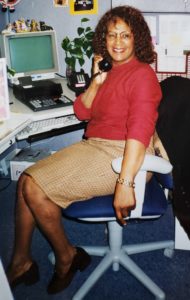
“But this disease is something else,” Leon was quick to add. “My life changed completely. I never dreamed in a million years that anything like that would happen to Helen, who had been an office worker and field representative for the government for many years.”
Based on his experience, Leon had some suggestions on how caregivers can find support. “Do the very best you can. Ask your friends. Go to support meetings. Go to the Internet. And pray for patience.”
Love was the key ingredient that helped Leon in his caregiving role. “If you don’t really love the person, don’t even try. That person depends 100 percent on you. Love and patience go a long way.”
Challenges of caregiver self-care
At the same time, Leon admitted to struggling to find the time and energy to care for himself, which is a common lament — and concern — for most Alzheimer’s caregivers.
Leon stopped going to the gym. He began turning down invitations to social engagements.
They even stopped going to church events, despite the strong faith that Leon and Helen both possessed. But Leon still relied on his faith to help him remain strong in his caregiving role.
“I stayed home,” Leon recalled. “The farthest I would go from the house was to the mailbox, about 20 steps from the door. Some days I would say, “˜It’s after 1 (in the afternoon), and I haven’t even gotten breakfast yet.'”
“When the boat is sinking, they tell you to put on your life jacket first to save others,” he added. “But I neglected my own health, to some degree.” Leon is now trying to take better care of himself.
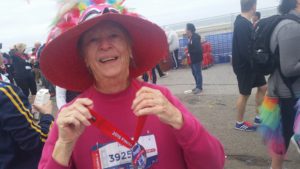
Jay, who is single, said he didn’t have much of a social life, “so I wasn’t giving up that much” when he took the lead in caring for his mother at home. Even so, he acknowledged that he’s had to cut back considerably on one of his favorite hobbies — swimming in the Bay.
The combination of caring for his mother and putting lots of hours into his start-up resulted in him gaining about 40 pounds.
“My general exercise routine has been interrupted. I used to exercise a lot,” Jay said. “It’s harder to do that. And I can’t just go out whenever I want. I’m a single guy who was used to doing whatever he wanted, and now I can’t.”
Tips to reboot and recharge
Tiffany has found that it’s common for caregivers to put their personal needs aside as the demands of their caregiving role increase. She encourages these caregivers to test out the benefits of taking a little time to reboot or recharge.
“I suggest that they try taking a short break, one time,” shared Tiffany. “You don’t have to commit to going on a bike ride every week or taking a long vacation. Just go to the coffee shop and read the entire newspaper. You will notice that when you return, you will be a better caregiver.”
Deciding to be a caregiver
Despite the personal challenges, both men felt that caring for their loved one at home was the best option in their situation.
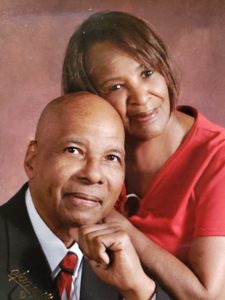
“In my culture, normally we take care of our people,” said Leon. I am Panamanian by birth, but my parents were Jamaicans, and I decided I would give 100 percent to Helen.”
Jay said it was a combination of finances and a sense of personal responsibility that led him and his siblings to care for their mother in the family home in Benicia. “We really couldn’t afford anything else, so that was a a big factor,” shared Jay. “Also, she’s my mom and I want to care for her.”
“She spent a good chunk of her life taking care of me,” Jay said. “it just seems right to return the favor.”
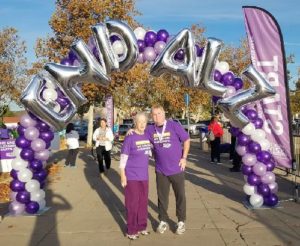
For ongoing moral support, Jay has turned to a men’s group that he’s been a part of for 25 years. He and his siblings have had a home health aide come in “every once in a while.” This was especially helpful as the three first put together a schedule for shared caregiver responsibilities.
“It’s just important to ask for help and find out where help is available,” he said. “I’m fortunate that I have my brother and sister here. If I didn’t have them, I would want to know what’s available and where I could get help.”
For his part, Leon has been an active member of an Alzheimer’s Association support group, and he continues to support the Alzheimer’s Association.
“When Helen died, I told everyone: “˜Don’t give flowers. Whatever you are going to give, send it to the Alzheimer’s Association or the Area Agency of Aging.’ I’ve done the Walk to End Alzheimer’s for four years, and I plan to be on that walk for as long as I am able.”
Besides brief education workshops, the Alzheimer’s Association of Northern California and Northern Nevada holds several half-day and all-day education events for caregivers throughout our region. View the schedule of upcoming support groups or conferences and other education events.
Learn more:







